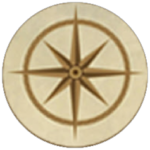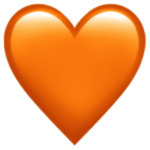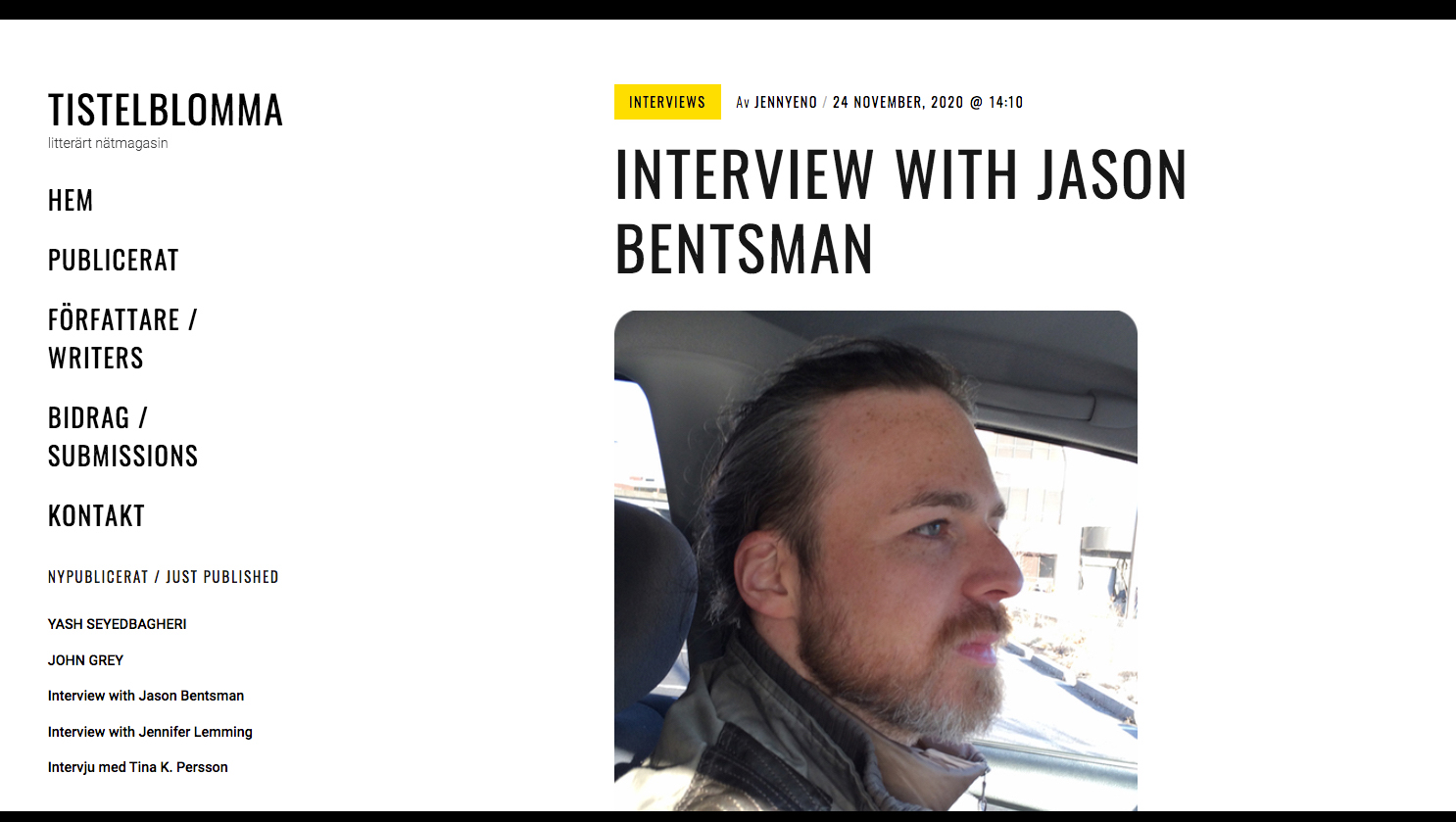
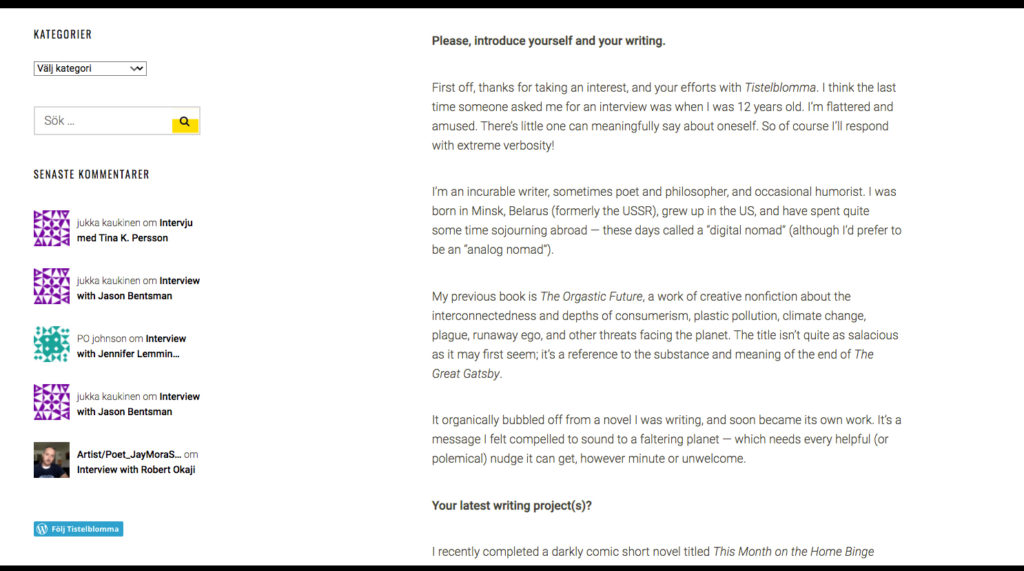
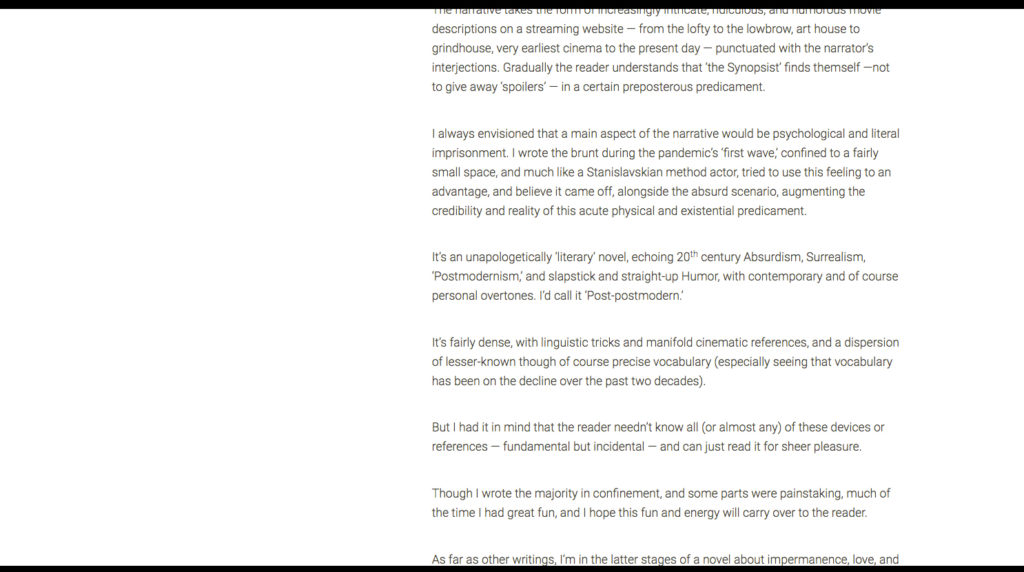
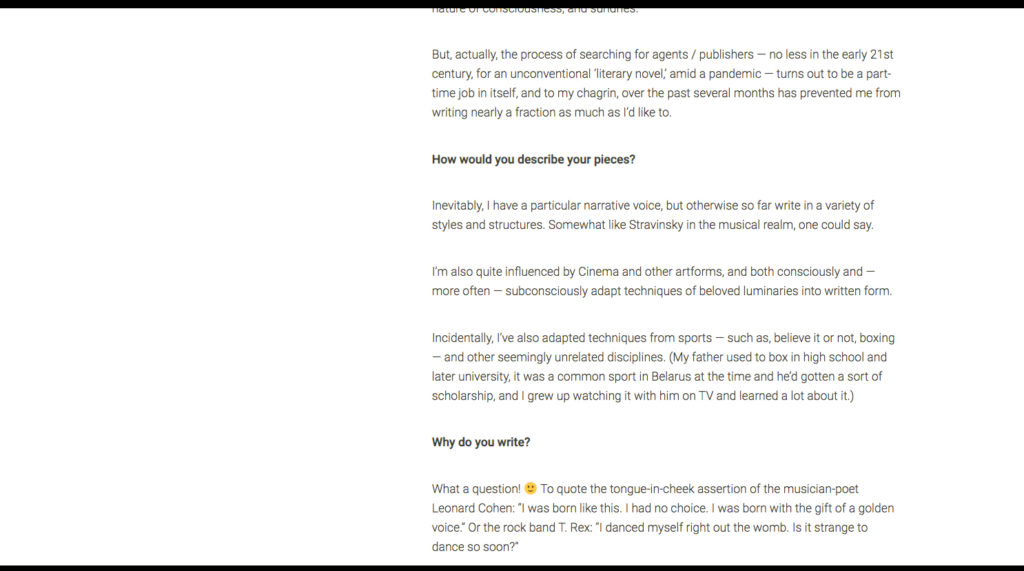
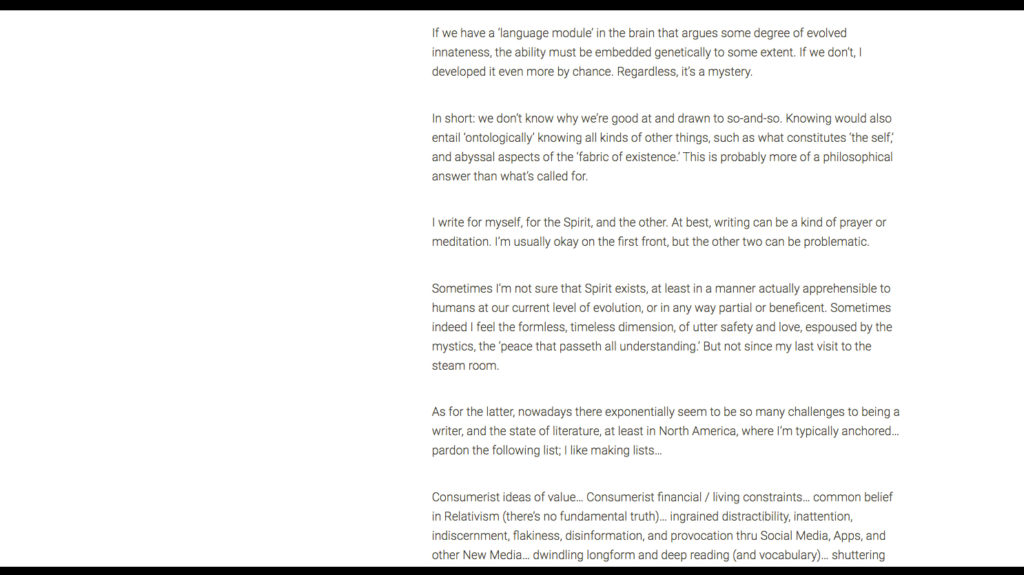
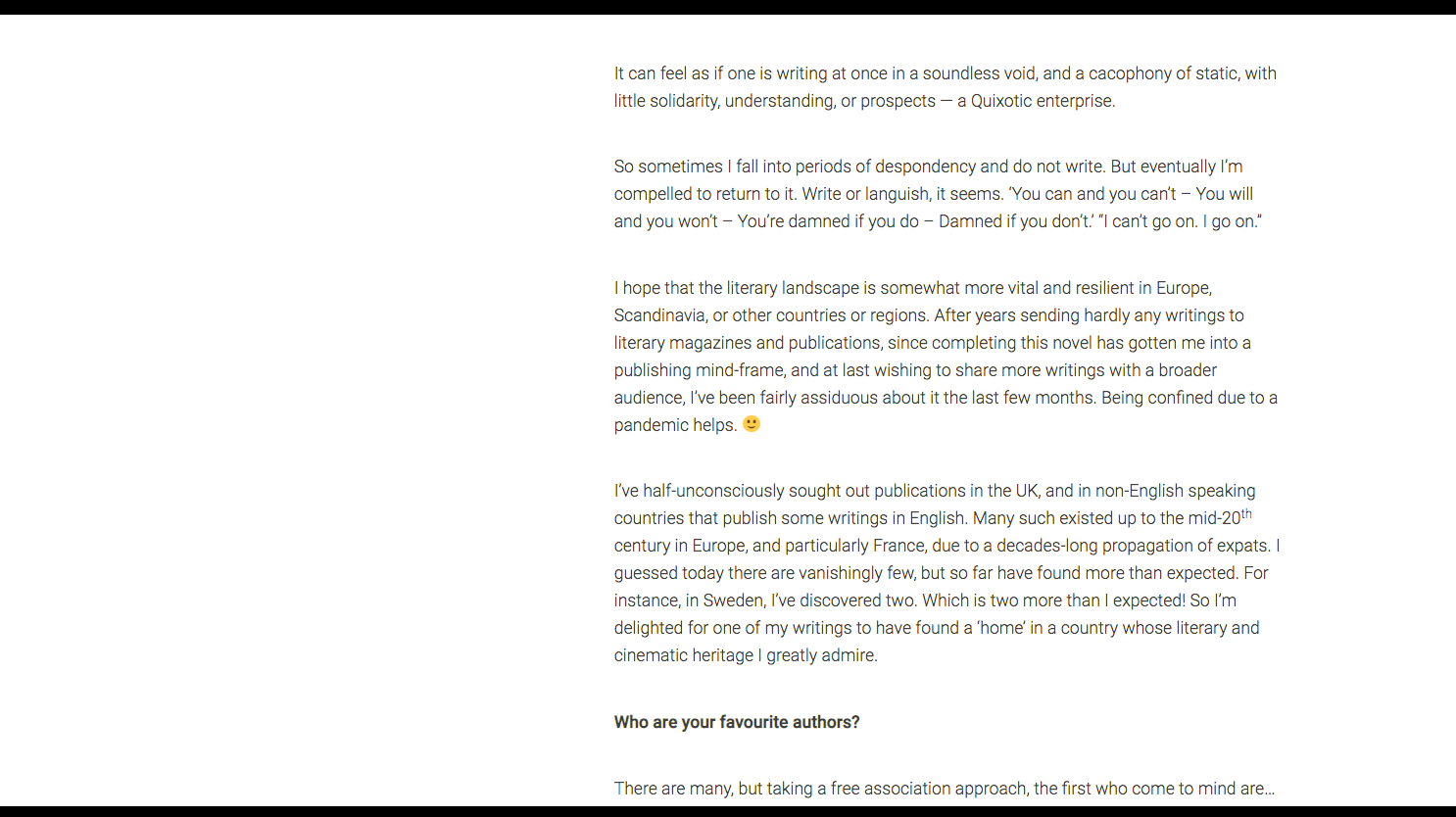
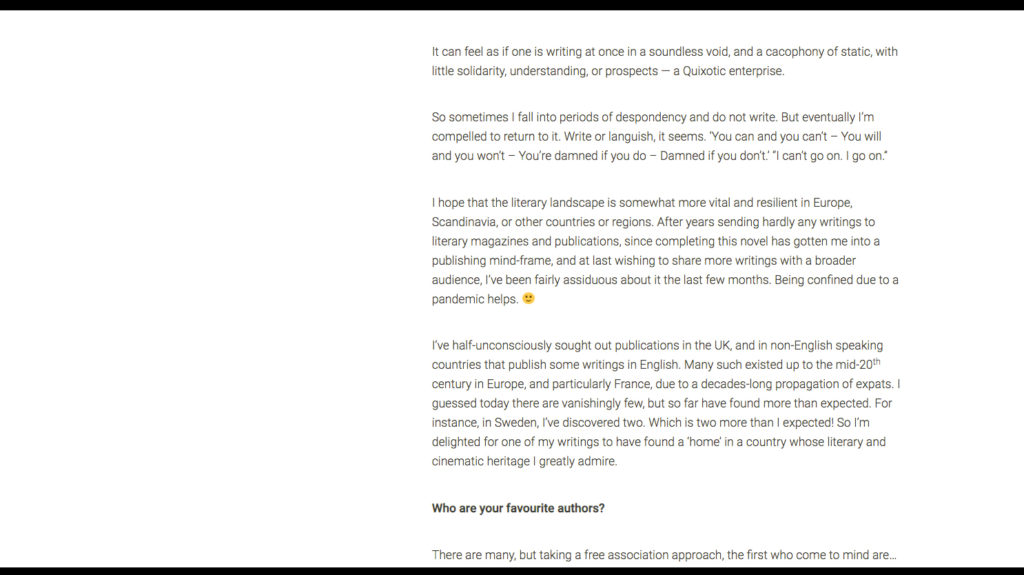
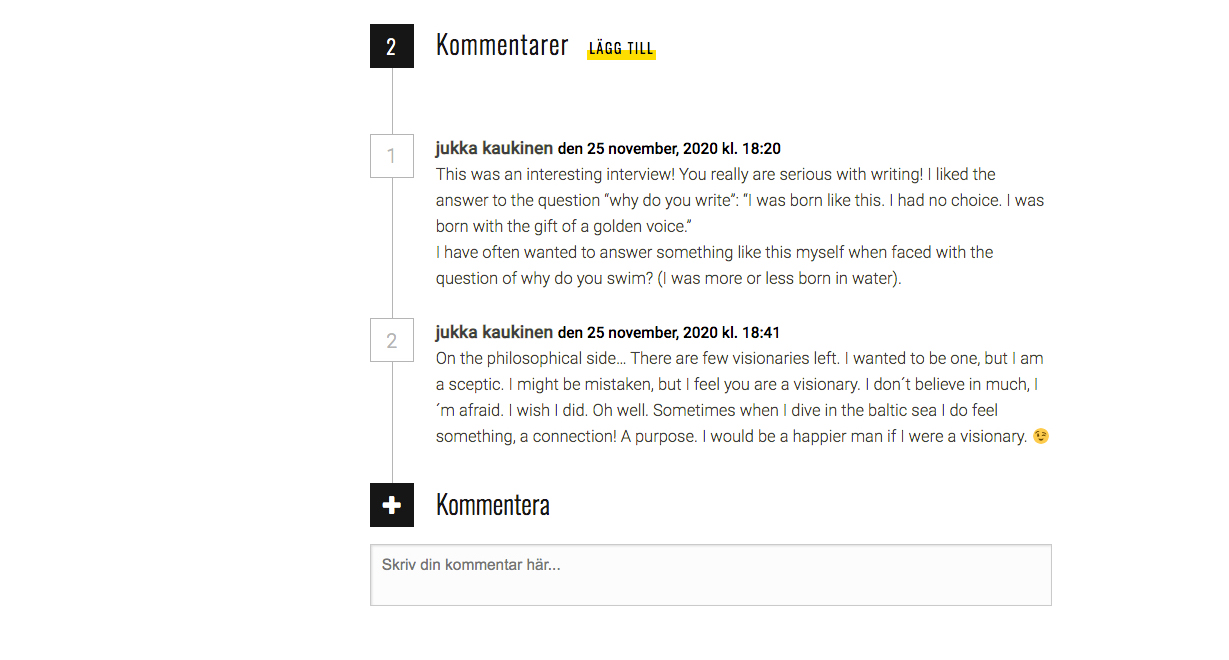
Please, introduce yourself and your writing
First off, thanks for taking an interest, and your efforts with Tistelblomma. I think the last time someone asked me for an interview was when I was 12 years old. I’m flattered and amused. There’s little one can meaningfully say about oneself. So of course I’ll respond with extreme verbosity!
I’m an incurable writer, sometimes poet and philosopher, and occasional humorist. I was born in Minsk, Belarus (formerly the USSR), grew up in the US, and have spent quite some time sojourning abroad—these days called a “digital nomad” (although I’d prefer to be an “analog nomad”).
My previous book is The Orgastic Future, a work of creative nonfiction about the interconnectedness and depths of consumerism, plastic pollution, climate change, plague, runaway ego, and other threats facing the planet. The title isn’t quite as salacious as it may first seem; it’s a reference to the substance and meaning of the end of The Great Gatsby.
It organically bubbled off from a novel I was writing, and soon became its own work. It’s a message I felt compelled to sound to a faltering planet—which needs every helpful (or polemical) nudge it can get, however minute or unwelcome.
Your latest writing project(s)?
I recently completed a darkly comic short novel titled This Month on the Home Binge Office: a paean to Cinema, questioning of contemporary media habits, and existential exploration. Which I’ve embarked on the daunting process of looking for a publisher for. [Ed. Note: I’d thought I’d completed it; but I hadn’t.]
The narrative takes the form of increasingly intricate, ridiculous, and humorous movie descriptions on a streaming website—from the lofty to the lowbrow, art house to grindhouse, very earliest cinema to the present day—punctuated with the narrator’s interjections. Gradually the reader understands that ‘the Synopsist’ finds themself—not to give away ‘spoilers’—in a certain preposterous predicament.
I always envisioned that a main aspect of the narrative would be psychological and literal imprisonment. I wrote the brunt during the pandemic’s ‘first wave,’ confined to a fairly small space, and much like a Stanislavskian method actor, tried to use this feeling to an advantage, and believe it came off, alongside the absurd scenario, augmenting the credibility and reality of this acute physical and existential predicament.
It’s an unapologetically ‘literary’ novel, echoing 20th century Absurdism, Surrealism, ‘Postmodernism,’ and slapstick and straight-up Humor, with contemporary and of course personal overtones. I’d call it ‘Post-postmodern.’
It’s fairly dense, with linguistic tricks and manifold cinematic references, and a dispersion of lesser-known though of course precise vocabulary (especially seeing that vocabulary has been on the decline over the past two decades).
But I had it in mind that the reader needn’t know all (or almost any) of these devices or references—fundamental but incidental—and can just read it for sheer pleasure.
Though I wrote the majority in confinement, and some parts were painstaking, much of the time I had great fun, and I hope this fun and energy will carry over to the reader.
As far as other writings, I’m in the latter stages of a novel about impermanence, love, and sex. Other works on the backburner, in partial stages of completion, include a handful of stories, a ruminative travelogue paralleling accounts of summer travels three decades apart, a few plays, a sprinkling of poems, a philosophical book about evolution and the nature of consciousness, and sundries.
But, actually, the process of searching for agents / publishers—no less in the early 21st century, for an unconventional ‘literary novel,’ amid a pandemic—turns out to be a part-time job in itself, and to my chagrin, over the past several months has prevented me from writing nearly a fraction as much as I’d like to.
How would you describe your pieces?
Inevitably, I have a particular narrative voice, but otherwise so far write in a variety of styles and structures. Somewhat like Stravinsky in the musical realm, one could say.
I’m also quite influenced by Cinema and other artforms, and both consciously and—more often—subconsciously adapt techniques of beloved luminaries into written form.
Incidentally, I’ve also adapted techniques from sports—such as, believe it or not, boxing—and other seemingly unrelated disciplines. (My father used to box in high school and later university, it was a common sport in Belarus at the time, and I grew up watching it with him on TV and learned a lot about it.)
Why do you write?
What a question! 🙂 To quote the tongue-in-cheek assertion of the musician-poet Leonard Cohen: “I was born like this. I had no choice. I was born with the gift of a golden voice.” Or the rock band T. Rex: “I danced myself right out the womb. Is it strange to dance so soon?”
I started writing creatively almost as soon as I could hold a writing implement. I was naturally good at it, and loved it. It’s what one might call ‘God-given.’
If we have a ‘language module’ in the brain that argues some degree of evolved innateness, the ability must be embedded genetically to some extent. If we don’t, I developed it even more by chance. Regardless, it’s a mystery.
In short: we don’t know why we’re good at and drawn to so-and-so. Knowing would also entail ‘ontologically’ knowing all kinds of other things, such as what constitutes ‘the self,’ and abyssal aspects of the ‘fabric of existence.’ This is probably more of a philosophical answer than what’s called for.
I write for myself, for the Spirit, and the other. At best, writing can be a kind of prayer or meditation. I’m usually okay on the first front, but the other two can be problematic.
Sometimes I’m not sure that Spirit exists, at least in a manner actually apprehensible to humans at our current level of evolution, or in any way partial or beneficent. Sometimes indeed I feel the formless, timeless dimension, of utter safety and love, espoused by the mystics, the ‘peace that passeth all understanding.’ But not since my last visit to the steam room.
As for the latter, nowadays there exponentially seem to be so many challenges to being a writer, and the state of literature, at least in North America, where I’m typically anchored… pardon the following list; I like making lists…
Consumerist ideas of value… Consumerist financial / living constraints… common belief in Relativism (there’s no fundamental truth)… ingrained distractibility, inattention, indiscernment, flakiness, disinformation, and provocation thru Social Media, Apps, and other New Media… dwindling longform and deep reading (and vocabulary)… shuttering bookstores, suffusing commercialism… spreading anti-intellectualism and sophistry, factlessness and polarization… and in general the state and future of the environment, climate, and pollution, resources, health, and survival… that it can be difficult to keep up morale.
It can feel as if one is writing at once in a soundless void, and a cacophony of static, with little solidarity, understanding, or prospects—a Quixotic enterprise.
So sometimes I fall into periods of despondency and do not write. But eventually I’m compelled to return to it. Write or languish, it seems. ‘You can and you can’t – You will and you won’t – You’re damned if you do – Damned if you don’t.’ “I can’t go on. I go on.”
I hope that the literary landscape is somewhat more vital and resilient in Europe, Scandinavia, or other countries or regions. After years sending hardly any writings to literary magazines and publications, since completing this novel has gotten me into a publishing mind-frame, and at last wishing to share more writings with a broader audience, I’ve been fairly assiduous about it the last few months. Being confined due to a pandemic helps 🙂
I’ve half-unconsciously sought out publications in the UK, and in non-English speaking countries that publish some writings in English. Many such existed up to the mid-20th century in Europe, and particularly France, due to a decades-long propagation of expats. I guessed today there are vanishingly few, but so far have found more than expected. For instance, in Sweden, I’ve discovered two. Which is two more than I expected! So I’m delighted for one of my writings to have found a ‘home’ in a country whose literary and cinematic heritage I greatly admire.
Who are your favourite authors?
There are many, but taking a free association approach, the first who come to mind are… Tolstoi, Hesse, Kafka, Samuel Beckett, Marguerite Duras, Chekhov, Jung, Buddhist Theravāda texts, the King James Bible, Plotinus, Cervantes, Proust, Hawthorne, Keats, F. Scott Fitzgerald, Olaf Stapledon, Simone Weil, Einstein (essays), Andrey Zimin, Matt Saks, Steven Whelan, and I suppose that’s enough.
There are also certain authors and books that resonate wonderfully at one particular age, but not as much in others. Maybe this makes them less ‘universal,’ but some are able to unlock and galvanize the mindset and spirit of that developmental stage more than many of the former.
Also, though they may not be pound-for-pound favorites, certain writers and artists evince certain traits, techniques, and modes of revelation I greatly appreciate, sometimes unparalleled. No artist has a monopoly on Truth (including Beauty): each decent artist reveals some peculiar aspect of it, like a glint of a multifaceted gem.
Do you have a homepage?
Do I ever!
